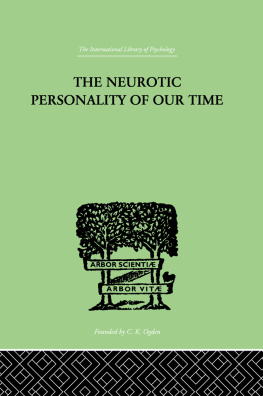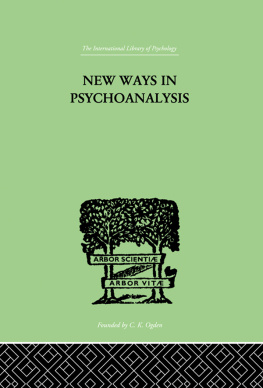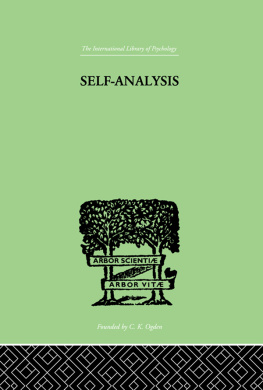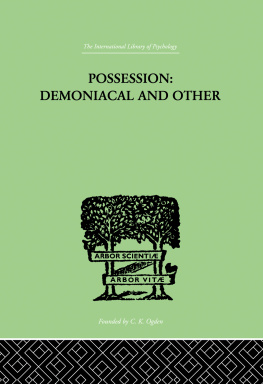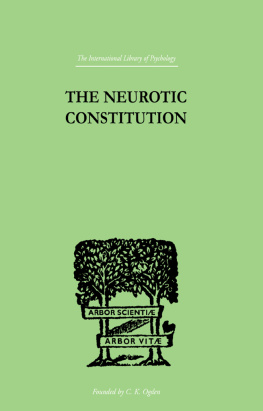
The International Library of Psychology
PSYCHOANALYSIS
In 28 Volumes
| I | The Elements of Practical Psycho-Analysis | Bousfield |
| II | A Neglected Complex and its Relation to Freudian Psychology | Bousfield |
| III | The Omnipotent Self | Bousfield |
| IV | The Social Basis of Consciousness | Burrow |
| V | What is Psychoanalysis? | Coriat |
| VI | The Psychoanalytic Theory of Neurosis | Fenichel |
| VII | The Technique of Psycho-Analysis | Forsyth |
| VIII | Leonardo da Vinci | Freud |
| IX | Totem and Taboo | Freud |
| X | Wit and its Relation to the Unconscious | Freud |
| XI | Morbid Fears and Compulsions | Frink |
| XII | Facts and Theories of Psychoanalysis | Hendrick |
| XIII | Fathers or Sons? | Hopkins |
| XIV | Neurosis and Human Growth | Homey |
| XV | The Neurotic Personality of Our Time | Homey |
| XVI | New Ways in Psychoanalysis | Homey |
| XVII | Our Inner Conflicts | Homey |
| XVIII | Self-Analysis | Homey |
| XIX | Childhood and After | Isaacs |
| XX | Social Development in Young Children | Isaacs |
| XXI | Problems in Psychopathology | Mitchell |
| XXII | The Psychoanalytic Method | Pfister |
| XXIII | The Trauma of Birth | Rank |
| XXIV | On the Bringing Up of Children | Rickman |
| XXV | Conflict and Dream | Rivers |
| XXVI | Psychoanalysis and Suggestion Therapy | Stekel |
| XXVII | Psychoanalysis and Behaviour | Tridon |
| XXVIII | Character and the Unconscious | vanderHoop |

First published in 1937
by Routledge, Trench, Trubner & Co., Ltd.
Reprinted in 1999 by
Routledge
2 Park Square, Milton Park, Abingdon, Oxon, OX 14 4RN
Transferred to Digital Printing 2007
1937 Karen Horney
All rights reserved. No part of this book may be reprinted or reproduced or utilized in any form or by any electronic, mechanical, or other means, now known or hereafter invented, including photocopying and recording, or in any information storage or retrieval system, without permission in writing from the publishers.
The publishers have made every effort to contact authors/copyright holders of the works reprinted in the InternationalLibraryofPsychology. This has not been possible in every case, however, and we would welcome correspondence from those individuals/companies we have been unable to trace.
These reprints are taken from original copies of each book. In many cases the condition of these originals is not perfect. The publisher has gone to great lengths to ensure the quality of these reprints, but wishes to point out that certain characteristics of the original copies will, of necessity, be apparent in reprints thereof.
BritishLibraryCataloguinginPublicationData A CIP catalogue record for this book is available from the British Library
The Neurotic Personality of Our Time
ISBN 0415-21096-8
Psychoanalysis: 28 Volumes
ISBN 0415-21132-8
The International Library of Psychology: 204 Volumes
ISBN 0415-19132-7
ISBN 978-1-1363-4164-9 (ePub)
CONTENTS
THE purpose I have had in mind in writing this book has been to give an accurate picture of the neurotic person who lives among us, with the conflicts which actually move him, with his anxieties, his suffering and the many difficulties he has in his relations with others as well as with himself. I am not concerned here with any particular type or types of neuroses, but have concentrated on the character structure which recurs in nearly all neurotic persons of our time in one or another form.
Emphasis is put on the actually existing conflicts and the neurotics attempts to solve them, on his actually existing anxieties and the defenses he has built up against them. This emphasis on the actual situation does not mean that I discard the idea that essentially neuroses develop out of early childhood experiences. But I differ from many psychoanalytic writers inasmuch as I do not consider it justified to focus our attention on childhood in a sort of one-sided fascination and to consider later reactions essentially as repetitions of earlier ones. I want to show that the relation between childhood experiences and later conflicts is much more in tricate than is assumed by those psychoanalysts who proclaim a simple cause and effect relationship. Though experiences in childhood provide determining conditions for neuroses they are nevertheless not the only cause of later difficulties.
When we focus our attention on the actual neurotic difficulties we recognize that neuroses are generated not only by incidental individual experiences, but also by the specific cultural conditions under which we live. In fact the cultural conditions not only lend weight and color to the individual experiences but in the last analysis determine their particular form. It is an individual fate, for example, to have a domineering or a self-sacrificing mother, but it is only under definite cultural conditions that we find domineering or self-sacrificing mothers, and it is also only because of these existing conditions that such an experience will have an influence on later life.
When we realize the great import of cultural conditions on neuroses the biological and physiological conditions, which are considered by Freud to be their root, recede into the background. The influence of these latter factors should be considered only on the basis of well established evidence.
This orientation of mine has led to some new interpretations for a number of basic problems in neuroses. Though these interpretations refer to disparate questions such as the problem of masochism, the implications of the neurotic need for affection, the meaning of neurotic guilt feelings, they all have a common basis in an emphasis on the determining role that anxiety plays in bringing about neurotic character trends.
Since many of my interpretations deviate from those of Freud some readers may ask whether this is still psychoanalysis. The answer depends on what one holds essential in psychoanalysis. If one believes that it is constituted entirely by the sum total of theories propounded by Freud, then what is presented here is not psychoanalysis. If, however, one believes that the essentials of psychoanalysis lie in certain basic trends of thought concerning the role of unconscious processes and the ways in which they find expression, and in a form of therapeutic treatment that brings these processes to awareness, then what I present is psychoanalysis. I believe that a strict adherence to all of Freuds theoretical interpretations entails the danger of tending to find in neuroses what Freuds theories lead one to expect to find. It is the danger of stagnation. I believe that deference for Freuds gigantic achievements should show itself in building on the foundations that he has laid, and that in this way we can help to fulfill the possibilities which psychoanalysis has for the future, as a theory as well as a therapy.

